50+ Best Side Hustle Ideas For 2024 (+ How To Get Started)

Want to pick up a legit side hustle so you can supplement your 9-5 and earn extra cash on the side?
We’ve got you covered.
In this article, we’re going to be introducing you to some legit side hustle ideas that you can use to make real money.
Whether you want to start putting some serious savings away for your retirement years, pay off student loans, or find a side hustle you can turn into a business – this list of ideas will help you.
And the best part? Most of these methods require little to no prior experience or skills to get started with.
You’ll find both online and offline side hustle ideas below.
1. Start a blog
Ok, so I might be a little biased, but blogging is one of the best ways to make some extra money online.
Don’t get me wrong, starting a blog isn’t super easy – it takes a lot of work. However, once you get it up and running, it can potentially earn you upwards of $1000 a month. The top blogs even make over $1M per year.
You can monetize your blog by selling products, running ads, promoting your affiliates, and more. All you need to do is choose a niche that you’d like to write about and get started.
The great thing about starting a blog is that you can write about literally anything that interests you, so it can be a really fun hobby as well as a side hustle. For example, Tone Island is a niche blog about guitar gear – if you have an interest, chances are you can create a blog about it.

How to get started
First, you’ll need to choose a domain name and a hosting plan. You can do this through sites like Bluehost and GoDaddy. After that, you can use WordPress to build your site.
Once your website is up and running, you can start researching and writing articles to drive traffic to your blog. Once you have enough traffic, you can monetize it.
This is a very brief overview, but there’s a lot more to know about successfully starting a blog. Check out our step-by-step guide on how to start a blog to learn more.
If you’ve already started a blog, be sure to check out our article on the best ways to monetize a blog.
2. Offer social media management services
With over 70% of the US using social media every day, demand for skilled social media managers is higher than it’s ever been. It’s imperative in this day and age for businesses to have a good social media presence, but many businesses just don’t have the time and resources to devote to it. That’s where social media managers come in.
They manage everything from posting and creating content to interacting with followers and responding to comments. Some skilled social media managers even manage social media ad campaigns and collaborations for their clients. If you’re an Instagram addict or Facebook fanatic, it may be the perfect role for you.
Many social media managers do it as a full-time job and work with many clients at once. However, if you want to do it as a side-hustle, you can just work with one or two clients at a time so that the workload doesn’t become too demanding.
You can earn between $20 and $50 per hour as a social media manager.
How to get started
The easiest way to find clients as a social media manager is to sign up for a freelancer marketplace like Upwork. Fill out your profile with relevant skills and examples of your previous work. You may also want to invest in a good social media management tool to make managing your workload easier and more organized.
3. Start an ecommerce store
Starting an e-commerce store is a lot of work. However, if you put in the effort, it can turn into a really lucrative side hustle. In fact, it can potentially even generate enough extra income that you can ditch your day job entirely.
The basic principle is pretty straightforward. It goes like this:
- Find a product that there’s a lot of demand for
- Buy the product in bulk from suppliers at wholesale prices
- Market and sell it online at a marked-up retail price
- Enjoy the profits
Of course, there’s a lot more to it than just that.
How to get started
To start an ecommerce store, you’ll need to spend a lot of time planning and preparing your business strategy.
You’ll need to find and validate a product idea by conducting careful market research, research the competition, determine your pricing and product margins, figure out what marketing channels you’re going to focus on, put together a marketing strategy, and more.
Once you’ve got a solid business plan in place, you can start to build your high-converting online storefront.
There are various ecommerce platforms you can use for this. BigCommerce is the best option for most stores, however, if you need a simple store, I’d recommend trying Sellfy.
4. Become a proofreader
Proofreading is a great side hustle for people that love to read and those who have great attention to detail.
With so much digital content being produced every day, the demand for proofreading services is high. Proofreading can pay anywhere from around $20 and upwards, with more prestigious jobs paying as much as hundreds of dollars.
Usually, proofreaders work on a freelance basis and are paid per project. You can find proofreading jobs on sites like Clickworker, Upwork, and Fiverr.
How to get started
Sign up for a freelancing marketplace like Fiverr or Upwork. Fill out your profile with your experience and relevant skills and you should find some projects in no time.
If you’d like to learn more about the state of freelancing, be sure to read our post on freelancing statistics.
5. Sell a digital product
Digital products are non-physical assets you can sell online repeatedly without having to restock your inventory. We’re talking about things like subscription/membership sites, software, ebooks, stock photos, videos, blueprints, PDFs, etc.
The great thing about selling digital products as a side hustle is there are very few overheads. You only have to write an ebook once, but you can sell it a thousand times without having to pay any further production costs.
Plus, unlike selling physical products, you don’t have to stock digital products, which means there’s no need for physical premises or warehouses to store them. As such, it’s a lot more flexible.
How to get started
First, you’ll need to figure out exactly what type of digital product you want to sell. I can’t offer you any specific recommendations here as there are so many possibilities.
Just make sure to validate your idea before you commit by making sure it’s not too competitive and there’s a real demand for what you’re selling.
Next, you’ll need to build your store. Selling digital downloads requires different website features and functions than selling regular physical products, so you’ll need the right tools for the job.
We’ve already compiled a list of the best ecommerce platforms to sell digital products – choose one of these platforms to create your store and go from there.
6. Start a YouTube channel
Did you know that YouTube is the most visited site in the world? It’s no surprise then that there is a lot of money to be made on the platform. Starting your own YouTube channel can be a great way to earn some extra cash.
In order to make money on YouTube, you need to be able to create decent, high-quality content, so a creative mind and a little knowledge of video editing are required.
The sky’s the limit when it comes to how much you can earn on YouTube. If you put in the time and effort to grow your channel and gain subscribers, you can earn a lot from sponsorships and YouTube advertising.
How to get started
Create a YouTube account and add some channel art to your channel. Then, plan and film some content and upload it. You won’t be able to start earning right away, but once your channel has reached over 4,000 viewed hours and 1,000 subscribers you can begin monetizing your content.
If you’re not sure how to grow your channel, check out our post on how to promote a YouTube channel.
7. Become a transcriptionist
If you’re not up for making your own YouTube videos, you could try becoming a transcriptionist and writing subtitles for videos instead.
As a transcriptionist, you can work from home, watch clips and episodes of video content, and get paid for it. All you have to do is transcribe the audio in each clip. It’s a pretty easy side hustle and you have the potential to earn around $10+/hour.
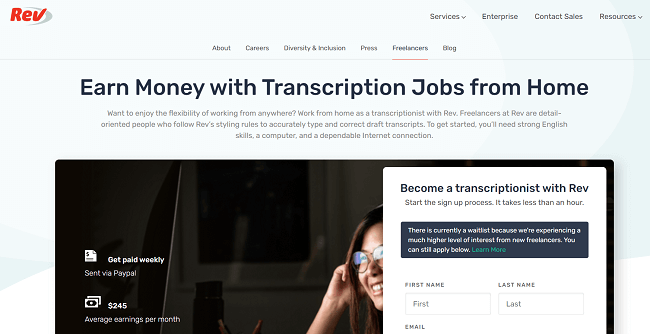
How to get started
Sign up for a transcription service like Rev.com and complete the application process. If your transcription skills are up to speed, you can start taking paid jobs.
8. List your unused space online
Letting your neighbors rent your unused space is a great way to earn extra money with very minimal effort.
Neighbor.com is the Airbnb of Storage, you can list your garage, basement, spare room, driveway, RV pad, dirt field, shed, or more and charge rent each month. You can choose what you want them to store and everything is taken care of through the app.
You can earn over $150/month by simply storing your neighbor’s boat in your backyard. Plus, everyone will think you own a boat!
They also give you up to $1,000,000 in free host liability coverage so you’re always covered.
How to get started
Sign up for free at Neighbor.com and list the space you’d like to list. Make sure to take good photos to make your listing stand out. You can then approve or deny rental applications until you find your ideal renter.
9. Grow a social media following
Growing a social media following can be tough, but once you’ve built up a good community, making money is a breeze. If you’re already a whizz with social media sites like Instagram then growing an account to a monetizable level shouldn’t be too difficult.
Simply pick a niche, upload high-quality content consistently and your follower count should steadily grow. Once your followers exceed around 10,000, you can start reaching out to brands and companies for sponsorships and collaborations.
How to get started
Start a social media account or spruce up the one you already have. Create a content plan and do some research into how you can boost your following. Then start posting and reaching out to brands once your follower count is high enough.
Remember, this isn’t an overnight side hustle, it will take time to grow your account, but it can be a serious moneymaker once you’ve got enough followers.
You’ll need one of these social media schedulers to help you save time.
10. Become a site tester
Businesses are keen to ensure that their websites work well and are easily accessible for users. As a result, there is a large demand for site testers that can test sites before they go live.
Becoming a site tester is quite easy, and you don’t need a particular set of skills to get started. As long as you are computer literate, you could earn upwards $20/hour as a site tester.
How to get started
Apply to become a site tester on sites like Usertesting.com. Complete the training period and start completing the tests. You may also be asked to take part in live interviews which pay even more than the tests.
11. Teach English online
For native speakers of English, teaching English online is one of the easiest side hustles to get started with. Jobs are abundant, and most pay in excess of $15/hour.
Since most jobs are available for teaching children in Asia, hours can be a little unsociable depending on your location. You may have to work early in the morning or late at night. However, if you’re trying to fit it in around your regular working schedule, this could be just what you need.
In most cases, you don’t need any previous teaching experience, if you speak English natively, and can chat to children and help them learn, then this will be just fine. It also helps if you have a bachelor’s degree and a TEFL certificate.
How to get started
Check out current job listings on sites like RemotelyWorking. Apply for your chosen job, complete the recruitment process, and get started. Getting hired as an English teacher online can often take less than a week.
12. Become a freelance writer
Freelance writers are in very high demand right now, which makes this a great side hustle idea. There are many different types of freelance writers, but I’d recommend focusing on content writing or copywriting – this is where the greatest demand is at the moment.
Content writers create informative, useful content for marketing purposes. This includes things like blog posts, articles, ebooks, and whitepapers.
Copywriters focus more on the ‘selling’ side of things. They craft compelling, persuasive web copy to help businesses sell more products. This includes promotional materials, landing page copy, email copy, and more.
Experienced freelance copy and content writers can earn upwards of $0.10 per word. That means that, for a 2,000-word article, you can get paid $200. If you can write one of those a day (trust me, it’s doable), that’s an extra $1,400 per week in your pocket. Not bad, right?
How to get started
The first step in getting started as a freelance writer is to create a portfolio of work. It doesn’t matter if you don’t have any paid experience as a writer just yet. For now, you can create your own free website, self-publish blog posts to that website, and use that as your portfolio. Just make sure you learn how to write great blog posts first.
Once you have a portfolio, you can start bidding for jobs on freelance job websites like Upwork or Freelancer. There’s a ton of available work on these kinds of platforms so it shouldn’t take long to land your first gig.
I’d recommend pitching lower rates at the start while you build up your experience and get a portfolio of bylined articles under your belt. After that, you can start charging more and earning big bucks.
If you need help, I’d recommend checking out Elna Cain’s WriteTo1K course.
13. Become a content editor
This one’s similar to the above, except that this time, you won’t be writing the content yourself – you’ll be editing other people’s work.
If you’re a perfectionist by nature with strong writing skills and a great eye for detail, you can become a content editor and start getting paid to read over and edit written content.
Your job will be to pick out any spelling or grammatical errors, tidy up the content, make sure it adheres to your client’s style guidelines, and generally get it ready for publication. You might also be required to optimize it for search and upload it to your client’s website.
It might sound difficult, but it’s all stuff you can learn fairly quickly. Many content writers and editors are completely self-taught.
How to get started
Again, the steps here are similar to getting started as a content writer. You’ll need some samples of your work to show clients, so start by creating a portfolio.
You can use blog posts you’ve written, edited, and published yourself as samples in the beginning then expand your portfolio to include paid work once you’ve landed your first few jobs.
Content editors can find work on freelance platforms like Upwork as well as with publishers and media companies.
14. Start a dropshipping business
Another way to earn more money online is to start a dropshipping business. Like running an eCommerce store, dropshipping involves selling products to consumers.
The difference is that with dropshipping, you don’t have to actually stock the products yourself. Instead, your supplier fulfills the order for you and ships the product directly to your customers.
The basic premise is that you market and sell products to customers at a marked-up price. Whenever you get a sale, you place an order with your vendor and have them ship it directly to the customer. The price you pay to your vendor is less than the price you sell for, so you pocket the difference as profit.
The advantage of this method is that you don’t have to pay for a warehouse to stock your products or purchase stock in advance, which makes it a low-risk venture.
How to get started
Here are the basic steps to starting a dropshipping business:
- Find a product you want to sell and validate your product idea
- Find a supplier that offers dropshipping retail fulfillment for that product
- Set up an online store from which you can sell that product
- Launch a marketing campaign to drive traffic to your store and generate sales
- Take the profits!
Of course, there’s a little more to it than that. Dropshipping is a competitive industry and finding a gap in the market where you can make sales and still make a decent profit margin is tough.
The good news is that there are dropshipping sites that can facilitate much of this process for you. Spocket is a good example – it can handle the entire process for you. including connecting with an existing store.
You’ll need to spend some time planning your business strategy to make sure you know what you’re doing before you get started.
Related Reading: Is Dropshipping Worth It? Pros And Cons You Should Know
15. Sell print-on-demand goods
Selling print-on-demand goods is similar to dropshipping but for a specific kind of product. If you’re a talented artist or graphic designer, this could be a great side hustle.
The idea is to create designs for products like t-shirts and mugs and then sell them through a print-on-demand service. Once a customer orders the product, you have it printed and shipped to them
Because you don’t pay for the product to be printed with your design until you’ve already made a sale, it’s a low-risk business model that requires little to no investment.
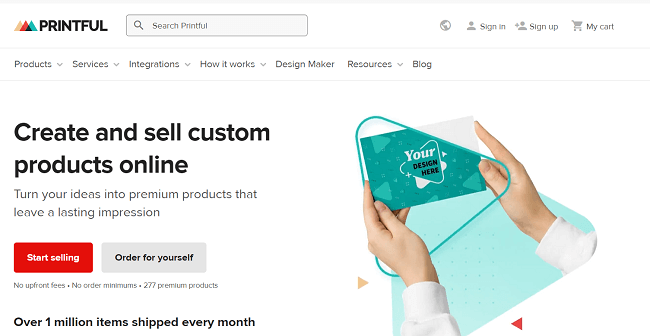
How to get started
You have a few different options available to you.
If you have don’t have an ecommerce store yet, you can sell print-on-demand goods with an all-in-one ecommerce platform like Sellfy.
If you already have an ecommerce store running on a platform such as Shopify, Printful makes it easy to sell print-on-demand products. It also integrates with BigCommerce, WooCommerce, and many more.
Alternatively, you could use a marketplace like Zazzle. You don’t get as much control over how your products are sold, but you do get access to their built-in audience. It’s worth considering that you’d also be promoting the platform your competitors use.
You can learn more in our article on the best print-on-demand sites.
16. Write an ebook
Another great way to earn more money online passively is to write and sell an ebook.
How-to and educational ebooks are a great option as there’s always a ton of demand for them. Try to find a gap in the market – a need that’s not currently being met – and create an ebook on that topic.
You can write it yourself or commission someone else to do it for you. There are lots of freelance platforms out there where you can list the job and find a professional author to write it.
Good writers will charge anything from $0.05 to $0.50 per word, and the average how-to or self-help book is around 40,000 words, so expect to pay at least a couple of thousand dollars initially if you outsource it.
How to get started
First, write your ebook. Then, self-publish it and list it for sale on Amazon Kindle Direct Publishing or any other platform you want to focus on. To generate your first few sales and get some momentum, you might want to promote it yourself by running an ad campaign.
17. Become an online consultant
If you have a particular area of expertise, and you want to monetize your knowledge then you might want to consider offering online consultancy services. You can become a consultant in any industry as long as there is a need for it.
For example, if you have a lot of experience as an HR manager, then you may be able to offer consultancy services to new businesses that are building up an HR department.
The great thing about consultancy work is that you’re free to work completely on your own schedule and take meetings whenever you have the time. And, because you’re an expert in your consultancy field, consultancy fees are usually very high. Great pay and flexibility make it the perfect combination for a side hustle.
How to get started
To get started as a consultant it’s a good idea to create a website and list your services and experience. You should also spruce up your LinkedIn profile so that you can use it to network and find clients to work with.
18. Launch an online course
Online courses are in high demand right now, so if you think you have some valuable knowledge to share that people would be willing to pay for, this might be a great option.
The great thing about selling online courses is you only have to invest your time and money in the initial stage while you’re getting set up.
Once your online course is created and listed online, you can sell it again and again and again without spending another dime. It can also start to bring in more money passively and become a passive income source.
How to get started
All you need to do to get started is create your course using an online course platform. Some platforms like Thinkific will even allow you to create and launch a course for free. You can sell your course via a dedicated landing page, or market it via social media, email, or search.
19. Become a translator
If you speak another language, it’s pretty easy to find jobs online that can help you to boost your income. No matter what language you speak, there is always a demand for translation services. Most online work for translators is translating web content for businesses that are looking to branch out and reach new demographics.
If you’re fluent in both English and another language, it’s a pretty easy way to make some extra cash online. What languages you speak will determine how much you are paid but most translators earn around $20/hour.
How to get started
Create a profile on sites like Upwork and Fiverr. Search for jobs and bid on projects that you think are a good fit for your skillset.
20. Complete jobs on Mechanical Turk
Amazon Mechanical Turk is a site that helps businesses to complete tasks like Image and video processing, data clarification and cleanup, and information gathering. If you sign up for Mechanical Turk as a worker, you can complete micro-tasks like transcription, data deduplication, and research in your spare time.
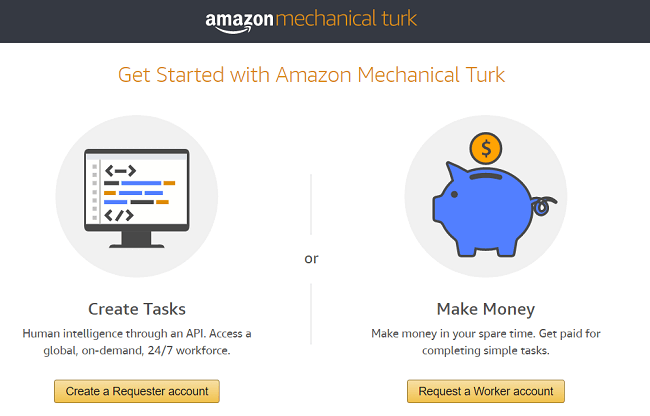
The tasks on Mechanical Turk are usually microtasks. They take a small amount of time to complete and pay less than a dollar per task. However, if you have a few hours per day to commit to completing these tasks, it’s possible to earn between $150 and $300 per week.
How to get started
Simply follow this link and sign up as an Amazon Mechanical Turk worker and start completing jobs.
21. Become a voiceover artist
Voiceovers are used regularly in advertising and video content, and most companies outsource their voiceover creation to freelancers. It’s quite easy to find voiceover projects online, so if you’re a smooth talker, then it could be worth a shot.
You’ll need a decent microphone and an extremely quiet recording space. This will help to ensure that all of your recordings are high-quality and professional. As a voiceover artist, you can expect to earn upwards of $20 per recording.
How to get started
List your services on sites like Fiverr. Check out some other voiceover artists to determine your prices and extra fees. If you don’t have much experience, price your services competitively to attract new clients and build your portfolio.
22. Offer web design services
If you have some experience with web design, then you could make a lot of money as a freelance web designer in your free time. Web designers are always in high demand, and it’s pretty easy to find freelance projects that you can complete in your spare time.
Also, as there is some level of skill and experience required for this job, freelance web designers are usually paid well for their services. Many freelance web designers work freelance full-time, so it should be easy to find enough clients to fill your time if you’re just looking to freelance as a side hustle.
How to get started
Create a portfolio website showcasing your work, and sign up for freelancer marketplaces like Upwork and Fiverr. Browse the job listing and bid for jobs that you think will be a good fit for your skillset. If you’re still new to web design, price your services competitively to build up your portfolio.
23. Offer graphic designs services
This is the perfect side hustle for artists, as it is a great way to earn money and utilize your creative design skills. As a freelance graphic designer, you can work on a variety of business logos and branding elements, merchandise, and more.
In recent years, online logo makers & stock design platforms have been gaining popularity but they cannot compete with what a skilled graphic designer can offer.
In order to get jobs, you’ll need to know your way around design programs like Photoshop and Illustrator, but if you already have these skills you should find it easy to find clients. How much you earn will depend on the project, but graphic designers tend to be well paid for their services
How to get started
Compile your designs and create an online portfolio to show to potential clients. Search for jobs on sites like Upwork and Fiverr.
24. Start a Twitch stream
If you love gaming, then Twitch streaming will be your dream side hustle. Twitch is a community for live streaming. Most people stream gaming, but some people stream themselves cooking, walking, or just hanging out.
If you have a good following on Twitch, it’s easy to make money. Firstly, your followers can make donations to your channel, which is quite common. You can also score sponsorship deals and earn more money that way.
Unless you already have an online following, Twitch won’t be an overnight moneymaker, but if you stick at it and build your following, it can turn into a legitimate extra income source.
How to get started
Purchase the equipment you need for streaming such as a camera, microphone, and computer. Then create your channel and start streaming.
Related reading: 11 ways to make money playing video games.
25. Sell stock photos online
If you’re a keen photographer, then you may be able to turn your hobby into a side hustle. Users across the internet need high-quality photos for their web content and products, and there’s always a demand for new stock images.
By selling stock images, you won’t be able to make a ton of money, but you may be able to make enough to boost your regular income and reach your savings goals faster.
There are many sites where you can list your images for sale, but most of them take a percentage of the sale as a commission which reduces the amount of profit the creator makes.
It’s also possible to sell stock images through your own site and cut out the middleman, but this is a little more difficult to do and would require more time and commitment before you start to see financial returns.
How to get started
Take some photos, or compile some photos that you already have saved. Sign up with websites like Alamy, iStock Photo, and Shutterstock and start selling.
You can find more sites in our post on stock photo websites, but remember that some of these sites will have exclusive agreements in place. So that’ll be something to check before you start selling.
26. Tutor students
This is a great option for college students or recent graduates. Aside from teaching English online, you can also tutor high-school and college students in a variety of different subjects.
If you have a particular subject specialism, you can tutor students in need of help via Skype or Zoom. Most tutors set their own prices and schedules and often charge $20/hour or more.
How to get started

Sign up for some tutoring platforms like Smarthinking or TutaPoint and start tutoring. Alternatively, you can reach out to potential students via college Facebook groups.
27. Become a virtual assistant
Virtual assistants perform all the duties of a regular assistant, including scheduling appointments, responding to emails, making phone calls, and organizing events and trips. The only difference is that they do it all virtually from the comfort of their own homes.
If you have an eye for details and organization, then it could be a side hustle for you. Since the pandemic began, more and more people are hiring virtual assistants to help them with tasks whilst they are not in the office, and assistants with previous administrative experience can hope to earn upwards of $20/hour.
How to get started
Search job boards and freelancer marketplaces like Upwork for roles that fit your experience and skillset. Apply, and start earning in your free time.
28. Become a text chat operator
If you don’t have a computer, but you’d like an online side hustle, then you may be interested in becoming a text message operator.
Many companies communicate with their customers and clients via text or messaging apps, which means there are quite a lot of openings for text message operators. As a text chat operator, you can hope to earn between $6 and $20/hour.
How to get started
Search online for companies that hire text chat operators and apply. Companies like Apple and Zapier regularly hire text chat operators, so they may be a good place to start.
29. Become an online customer service assistant
Remote customer service jobs are becoming more common, especially since the pandemic began in 2020. Many companies are realizing that remote customer service agents are cheaper and more efficient for their business, which is great news for side hustlers like us.
How much you earn as a customer service agent will depend on which company you work for and how many hours you work, but you can expect to earn upwards of $10/hour.
How to get started
The hiring process for online customer service agents is very similar to that of regular non-remote jobs. Simply search for remote customer service roles on sites like indeed.com or remote.co. Send off some applications and wait for the responses.
30. Start a podcast
Podcasts are extremely popular right now, and a successful podcast can be a great side earner. In order to create a podcast, you’ll need something interesting to talk about, as well as a computer and a podcasting microphone.
Podcasts earn money from advertising, so you will start to make money once your listenership increases and you can run ads and sponsorships in your show.
The hardest part of podcasting is finding a niche that people want to listen to. The most popular genre of podcasts is ‘comedy’, so if you’re naturally funny, this could be the side hustle for you.
How to get started
Plan out some episodes and do some research into creating and hosting a podcast. Record and edit your first show and upload it to your podcast platform of choice. For more guidance, check out this step-by-step guide on how to start a podcast.
31. Write resumes online
Tons of people would do anything to land their dream job, and that even includes getting someone else to write their resume for them.
If you know a bit about recruitment and think that you have the skills to write amazing and eye-catching resumes for people, then this could be the perfect side hustle for you. You can earn upwards of $40/hour writing resumes on a freelance basis, and you’ll have the freedom to choose projects and set your own schedule.
How to get started
Sign up to a freelancer site like Upwork.com and list your services. Most resume writers are charging around $40/per hour. If you want to build up your portfolio in order to appeal to clients, it may be a good idea to set your prices lower whilst you gain experience.
32. Become a Dog walker
Most of the side hustle ideas involve working from home. However, for those who love nature and the fresh air, dog walking is the perfect side hustle.
You don’t need any specific skills to become a dog walker, all you need is just a few hours free to be able to do is walk dogs in a professional and responsible way.
Dog walkers usually charge between $10 and $30 so it can be a great way to earn extra income.

The only downside is that demand for dog walking usually peaks during regular working hours (9-5) so you may struggle to find clients if you work those hours too. However, if your regular day job is outside these hours, then it might work well for you.
How to get started
You can take the old-fashioned route and distribute leaflets in your local area. Or you can list your services on dog walking apps like Rover or Wag!. Make sure you have insurance if it’s required in your place of residence.
33. Become a babysitter
Babysitting is another great job that you can do on the side of a regular 9-5 schedule. Demand for good babysitters is high as parents are becoming more conscientious about who they leave their kids with. Depending on where you live, and who you sit for, you could earn upwards of $50/hour for babysitting.
Beware though, in some places, there is a lot of red tape involved with working with children, so make sure you read up on any childcare requirements for your area. You may need to get a background check or complete a qualification.
How to get started
If you have friends with kids, you can start there and try to build up some references. They will help you to score sitting gigs with new families that you don’t know yet. You can also use babysitting apps like Care.com or UrbanSitter.
34. Become a tutor
Another great community-based side hustle is tutoring. Kids of all ages and students need a ton of help with their homework, and parents are willing to pay handsomely for people that can offer guidance and support. It helps if you’re a teacher by trade or have some experience in education, but a university degree may also be enough to score some gigs.
Particularly if you majored in a core subject such as math, English, or science. Tutors are usually paid upwards of $20 depending on experience, and the hours complement a regular working schedule well.
How to get started
Advertise your services in schools, youth clubs, and local parenting Facebook groups. You can also sign up for tutoring websites like Wyzant that can help you to find in-person gigs or online work.
35. Open an Etsy shop
Etsy is an online marketplace for vintage, handmade and bespoke goods. It’s the perfect place to sell your wares and make some extra money if you are the crafty, artistic type. You can sell everything on Etsy from unique clothing to handmade toys and gifts.

How much you can earn depends on what you sell, and how popular your items are, so the sky really is the limit. Many people make a full-time income selling unique goods on Esty.
How to get started
Research the platform and brainstorm some ideas of items you think would sell well. Sign up for an Etsy seller account and prepare your items for sale. Then all you can do is wait for the orders to start rolling in.
36. Become an Uber driver
Ridesharing apps like Uber have well and truly taken over the taxicab industry, and there’s now more demand than ever for Uber drivers.
To get started with Uber, you don’t even have to own your own car, you just need a driver’s license and one year of driving experience. Once you’ve passed the checks and signed up, you can rent a car from Uber and get started.
As many reviews online will tell you, uber drivers don’t make a ton of money, but you can make some extra cash from tips. The best thing about working for Uber is that it’s fully flexible so you can literally work whenever you want, which is perfect for side hustlers who already have a full-time job.
How to get started
Head over to Uber.com and sign up. Once you’ve passed your checks and prepared your car you can start taking rides.
37. Become a delivery driver
If you like driving, but you don’t want the hassle of dealing with passengers, then delivery driving might be your calling. There are tons of different companies that hire delivery drivers from food delivery services like uber eats to package delivery services like Amazon Flex.
Each company has its own set of requirements, but they are usually pretty flexible which is great for side hustlers that want to work on a casual basis. Most delivery drivers earn upward of $10 per hour.
How to get started
You can opt to work for a local company directly. Alternatively you could choose a company such as Uber Eats, DoorDash, or Amazon Flex and follow their sign-up process.
38. Become a driving instructor
If you have a driver’s license and you love to teach, then you may want to consider becoming a driving instructor.
Depending on where you live, you may have to pass some tests to become a certified instructor, but once you’ve passed, you can offer lessons in your local area in your free time. Driving instructors earn pretty good rates with most earning $40+ per lesson.
How to get started
Read up on the requirements for driving instructors in your local area. Get any qualifications you need and get started. You can advertise your service in your community or online.
39. Become a TV extra
Always wanted to star in movies? You don’t have to be George Clooney to get your face on TV, you simply need to sign up to be an extra. Extras are the people you see in the background of movies sipping on their coffee or walking their dog in the park.
It’s a pretty fun and easy side hustle, and you can make some pretty good money from it too. The amount you earn will depend on what shows you work on, or which agency you sign up with, but if you have some free time, it can be a great way to earn a few hundred dollars here and there.
How to get started
Google extras agencies in your area and register with them. Some agencies will charge a small one-time registration fee, but most are free. Then wait for the casting calls to roll in.
40. Become an Airbnb host
This is a great side hustle opportunity for people with spare bedrooms or holiday homes. Using Airbnb, you can rent out your free space to travelers, and charge them a pretty high premium for the privilege.
If you live in a popular tourist area, or you have a unique holiday home to rent out, you can make a pretty solid income from Airbnb hosting.
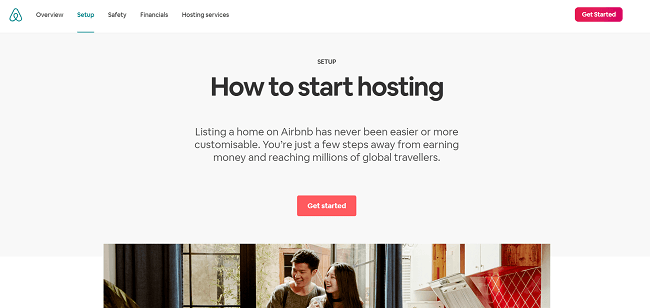
However, if you plan to rent out your spare room, be prepared to share your space with strangers, which can be disconcerting at times. Most Airbnb hosts say that the pros outweigh the cons when it comes to Airbnb, so it’s well worth considering if you want to earn some cash without too much effort.
How to get started
Head over to Airbnb and sign up for a host account. List your property and wait for your first booking.
41. Rent your parking space
If you’re not quite ready to rent out your home, but you have some space on your driveway that you’re willing to part with then you may want to consider renting it out.
Parking in major cities can be expensive, which is why people often want to rent parking spaces in residential areas that are close to where they work. Using sites like Parkwhiz or JustPark, you can easily rent out your parking space whenever it is free and earn some extra cash for your empty space.
How to get started
Sign up with a parking app or website. Research how many spaces in your area are renting for and list yours. And that’s it! Just wait for the money to hit your account.
42. Flip furniture
If you’re good at DIY and have a good eye for design, then flipping furniture may be for you. All you need to do is buy old furniture for a low price, spruce it up a little to make it more modern and attractive and then sell it on for a higher price. It’s quite a time-consuming side hustle, but it’s a fun and creative way to earn some extra cash.
How to get started
Source old furniture from sites like Craigslist, Freecycle, and Facebook marketplace. Upcycle them and sell them on sites like Etsy and Facebook marketplace. You can also sell furniture at yard sales or car boot sales.
43. Sell goods on the Facebook marketplace
On Facebook Marketplace you can find anything from old pallets to high-quality perfumes. If you are looking to earn a bit of extra cash, why not list some items for sale there? You can sell items from your home that you no longer use or source new items that you can sell for a marked-up price online.
How to get started
If you haven’t already got one, sign up for a Facebook account. List the items you want to sell and arrange the delivery method with the buyer. It’s a super simple process and a great side hustle for those times when you need a little extra cash.
44. Become a mystery shopper
Mystery shoppers visit stores to review them and rate the staff’s professionalism and interaction with the customers. Some companies pay for mystery shoppers to visit their stores to keep an eye on their staff.
Councils and government agencies also hire mystery shoppers to ensure that stores are operating in line with local laws such as alcohol and tobacco laws. Mystery shopping is a flexible and fairly easy gig that can earn you extra income.
How to get started
Sign up for a mystery shopping company in your area and tell them your availability. Some popular companies include BestMark and Second to None.
45. Join a research group
If you’re the opinionated type, then joining research and focus groups might be the perfect side hustle. When developing new products and services, companies are willing to pay for your opinions on everything from new product ideas to marketing campaigns.
You can earn as much as $150+ per focus group and they usually last a couple of hours. They’re a great way to make some extra money in your spare time.
How to get started
Find research and focus group events in your local area. You can use sites like Focusgroup.com or Paidfocusgroups.com to find suitable opportunities.
46. Take part in clinical trials
Taking part in clinical trials is not for everyone, but it is a surefire way to make money. Some people even take part in medical trials as a full-time job, but it’s much more suitable as a side hustle.
How much you earn from clinical trials usually depends on how long the trial takes. Some trials can take weeks, and you can earn thousands of dollars. Others will be daily trials and you’re likely to earn a lot less. If you can find trails that suit your availability, they’re a great way to boost your income. If you’re not scared of needles that is!
How to get started
Search online for clinical trials in your area and send off some applications for suitable trials. You will often need to meet a specific set of requirements based on your age and medical history, so you’ll need to send a new application for each trial.
47. Become a local tour guide
Becoming a tour guide is a fun way to learn more about your own hometown, and a great side hustle. Granted, if you live in the middle of nowhere, this may not be a great option, but if you’re lucky enough to live in a major city with a great tourist draw, then tour guides stand to make a lot of money.
How to get started
Devise a tour that you think will be popular with visitors to your area. It doesn’t have to be boring and historical; you could take them hunting for Insta-worthy photo spots or barhopping.
Then list your tour on tourism websites like TripAdvisor and Airbnb. Be sure to request reviews from your first few customers as this will make it easier to get more bookings in the future.
48. Offer DIY and gardening services
Pretty much every community has a need for general workers that complete DIY and gardening tasks, so if you have some time to spare, consider becoming the town handy-person.
Whether it’s cutting grass, painting fences or changing light bulbs, people are willing to pay for these things, and you could earn a decent side hustle income by listing your services in your local area.
How to get started
Post flyers in your local area and list your services on craigslist and community Facebook groups.
49. Place advertisements on your car
If you don’t care how your car looks, then car advertising is an easy, passive way to make money. All you do is place advertisements for business on your car and get paid to do it. It’s simple and hassle-free, making it the perfect side hustle for people with a busy schedule.
Earnings vary based on a number of factors like where you drive and how often your drive, but some people have reported earnings between $200 and $500 a month.
How to get started
Sign up with a company like Stickerride or Wrapify. Choose your ad and start earning.
50. Offer removal services
If you want a side hustle that is going to earn you money and keep you in shape, why not offer removal services. People move house all the time and the demand for movers to help with the heavy lifting is high.
If you have a van, that’s great. If not, you can just offer to be a spare pair of hands to help movers load and unload their own vans. You can earn a lot more if you have your own van, but without one, you can easily charge $20+ per hour for your time.
How to get started
List your services on community Facebook groups, on Craigslist, or post flyers in the local area. Alternatively, list yourself as a mover on sites like TaskRabbit.
51. Join TaskRabbit
TaskRabbit is like MechanicalTurk but for physical jobs. Basically, people list any micro-jobs that they need completing on TaskRabbit and you can accept the job and complete it for them.
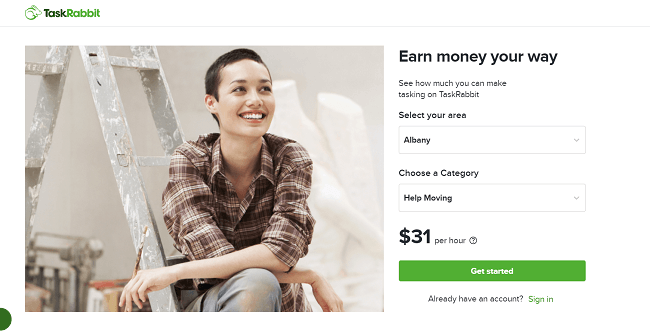
Jobs vary from assembling Ikea furniture to helping people plant flowers and more. The jobs on TaskRabbit are usually pretty simple to complete and pay $20+ on average.
How to get started
Sign up as a Tasker and fill out your profile to start taking jobs. There is a one-time $25 fee to register.
Side hustle ideas FAQ’s
Want to learn more about finding the perfect side job? Here are some frequently asked questions about online and offline side hustles.
What is a side hustle?
A side hustle is a job you do on the side of your regular day job to make money. If you work a 9-5, it can be hard to find opportunities to earn extra cash, but side hustles are jobs that are flexible and can be slotted in around your regular work schedule.
How do I make an extra $1000 a month?
There are lots of side hustles that will allow you to make an extra $1000 a month, but it all depends on how much work you put in.
With many of the online jobs like editing, proofreading, and writing, there is ample opportunity to earn over $1000 a month, but most will be paid on a project-by-project basis, so there is no guarantee that you will earn the same amount each and every month.
However, if you have the time and the motivation, it is possible to make a full-time income via online side hustles.
What is a good side hustle?
A good side hustle is one that fits in with your schedule and allows you to meet your earning requirements. What the best side hustle is will depend on the type of person you are, and what you like to do.
In my opinion, online side hustles like writing and editing are great, because you get the flexibility to work from the comfort of your own home, and they are fun and creative.
What are the most profitable side hustles?
On this list, the most profitable side hustle options include starting a blog, opening an e-commerce store, and growing a social media/YouTube following.
However, although these all have good earning potential, they are not overnight moneymakers and require a lot of time and effort to be profitable. That being said, if you have the time, and you’re willing to learn new skills, then these side hustles can easily replace your regular income over time.
How can I make extra money legally?
All the side hustles on this list are legal. The only thing you need to do is ensure you have the right insurance to do the job you’ve chosen and declare your earnings for tax purposes.
For example, if you choose to babysit, you may need to have special licenses depending on where you live. Make sure you do a little research into your chosen side hustle before you get started and you shouldn’t have any legal issues.
What are the best online side hustles?
Online side hustles are a great idea if your schedule is already pretty full up with your regular day job. You can work from the comfort of your own home, and on your own schedule.
Here are some of the best online side hustle ideas:
- Blogging – Starting a blog is a fun side hustle, and is a great way to earn passive income through affiliate marketing, advertising and sponsors etc. Blogging is the most lucrative side hustle, however, it takes a lot of effort and patience.
- Ecommerce stores – A relatively straightforward side hustle, filled with lucrative potential. Simply find a popular product and buy at wholesale prices, and sell online at retail price.
- Selling digital products – If you already have a blog, brand, or an influencer following, selling digital products such as subscriptions, ebooks, videos etc. can be an additional source of income. A great way to earn passive income.
- Sell your skills – We’ve mentioned a variety of skill related side hustles on the list: proofreading, transcriptionist, freelance writer to name a few. All these skill related side hustles are easy to get started or even learn, and you can do it all whilst in the comfort of your own home.
What are the best offline side hustles?
Not great with computers? No worries! There are tons of ways to hustle without working online.
Here are some of the best offline side hustle ideas:
- Rent out unused space – For those who have an empty field, a spare room, outbuildings, these can be rented out. An easy way to earn extra money, and this side hustle comes with minimal effort.
- Dog walking – A side hustle which comes with fresh air, exercise and of course some dogs! What’s not to love? This is perfect for those who work in the afternoon/evening, as peak dog walking time is usually during the day.
- Babysitting – If you have evenings free, then babysitting is a great side hustle. Most popular during the evening (when parents want a romantic night out).
- Delivery driver – Everybody loves a takeaway, so you’d be surprised how easy it is to become a delivery driver. All you need is a driving license and a car. Takeaways aren’t the only types of delivery drivers, there’s also becoming an Uber driver, Amazon Flex etc.
Final thoughts
There you have it – 50+ side hustle ideas you can use to start making some extra cash on the side.
As you can see, there are plenty of legitimate ways to earn extra money online and offline, so take your pick! Hopefully, you’ll find a side hustle that suits you on this list!
Related reading:
